
- **DISCLAIMER**
- Let' get right to it; How do you use BITCOIN AND CRYPTO CURRENCY WALLETS
- "The best time to get a self-custody wallet was yesterday, The next best time is today"- Crypto Casey
- So, without further ado, let’s get started!
- So you've just become a full-fledged bitcoin owner!
- Setting up a crypto currency wallet
- When you create a self-custody wallet,
- CHECK OUT THE RELATED ARTICLES HERE
- Fun Facts
- What is a Bitcoin and Crypto Currency Wallet?
- CHECK OUT THE RELATED ARTICLES HERE
- FAQ's
- Refferences
**DISCLAIMER**
- **DISCLAIMER**
- Let' get right to it; How do you use BITCOIN AND CRYPTO CURRENCY WALLETS
- "The best time to get a self-custody wallet was yesterday, The next best time is today"- Crypto Casey
- So, without further ado, let’s get started!
- So you've just become a full-fledged bitcoin owner!
- Setting up a crypto currency wallet
- When you create a self-custody wallet,
- CHECK OUT THE RELATED ARTICLES HERE
- Fun Facts
- What is a Bitcoin and Crypto Currency Wallet?
- CHECK OUT THE RELATED ARTICLES HERE
- FAQ's
- Refferences
I am not a Financial Adviser and This is not financial advice.
These images are brought to you by my personal favorite exchange, Crypto.com. I am not an affiliate currently, but hope this changes one day.
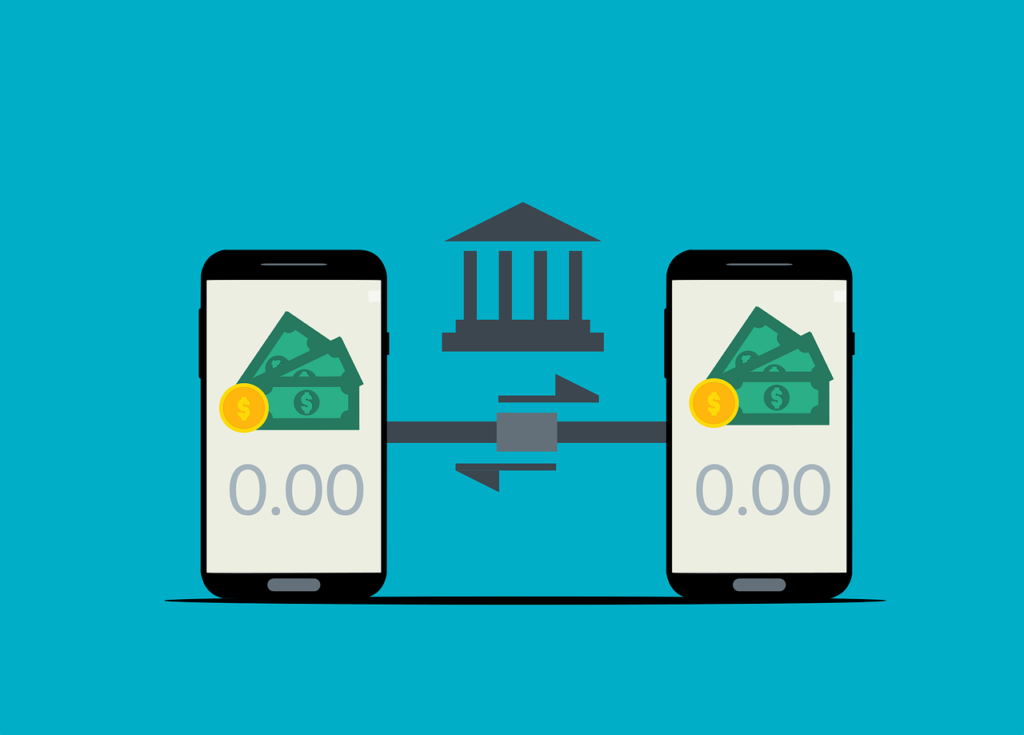
First, you need to set it up. Prioritize security features and control private keys (unique wallet pass ID) by choosing a self-custody wallet. Second, download and install the associated software. Third, Write down the recovery passphrase for your private keys. This is important! Don’t lose them! Forth, follow the setup instructions. Fifth transfer the crypto you bought on the exchange into your wallet.
"The best time to get a self-custody wallet was yesterday, The next best time is today"- Crypto Casey
So, without further ado, let’s get started!
The Cryptomedium only classifies self-custody Bitcoin and Crypto wallets as “true” wallets.
Custodial (third party) wallets are not real wallets in my opinion. They’re secured and highly trustworthy (in some cases) crypto bank accounts with 2FA, but not wallets.
Although I don’t these as real wallets, I’ll refer to them as custodial wallets for ease of communication.
So you've just become a full-fledged bitcoin owner!
You’re feeling on top of the world as you buy a whole bitcoin on an exchange. But then the unthinkable happens – the exchange goes bankrupt and your investment is gone. Better luck next time, buddy.
But what if there was a way to protect your investment? A way to keep your bitcoin even if the exchange goes broke. That’s where self-custody wallets come in.
The most secure type of wallet is a self-custody wallet. This means that you, and only you, hold the keys to your Bitcoin. The downside is that if you lose your keys, you lose your Bitcoin.
A wallet is a software that sits on your computer or phone and stores your Bitcoin keys. These keys are what you use to access your Bitcoin and Crypto, send it to others, and store it.
There are two types of self-custody wallets: hot wallets and cold wallets. Hot wallets are connected to the internet and therefore more vulnerable to hacks. Cold wallets are offline and therefore much more secure.
The most secure type of wallet is a self-custody wallet. This means that you, and only you, hold the keys to your Bitcoin. The downside is that if you lose your keys, you lose your Bitcoin.
The most popular self-custody wallets are hardware wallets. These are physical devices that look like USB sticks and have a small screen. They cost money, but they’re worth it if you’re serious about protecting your investment.
Setting up a crypto currency wallet
Is pretty easy and straightforward. But before we go into that, let’s first understand what a cryptocurrency wallet is.
A cryptocurrency wallet is basically a digital wallet where you can store your cryptocurrencies. Now, there are different types of wallets available, each with its own set of features and security levels.
So, how do you choose the right one? Well, that’s where your main considerations come in: security, ease of use, and compliance with government and financial regulations.
Once you’ve taken those into account, setting up your account is pretty simple. Just enter your personal info and choose a secure password.
There are many different types of Bitcoin and cryptocurrency wallets.
Some are online and some are offline. Some are software-based and some are hardware-based. Some are designed for security and some for ease of use.
It’s important to choose a wallet that meets your needs and that you can trust.
When you create a self-custody wallet,
You will be given a “seed” phrase. This is a list of words that can be used to restore your wallet if it is lost or stolen. It is very important to keep this seed phrase safe and secure.
Some custodial wallets allow you to set up 2-factor authentication (also called 2FA). This adds an extra layer of security by requiring you to enter a code from your phone in addition to your password when you log in.
You will need to provide personal information when you create a wallet. This is necessary to comply with government regulations. It is important to choose a platform that you trust and that has strong security measures in place.
Once you have created your account and chosen a secure password, you’re ready to start using your Bitcoin and cryptocurrency wallet.
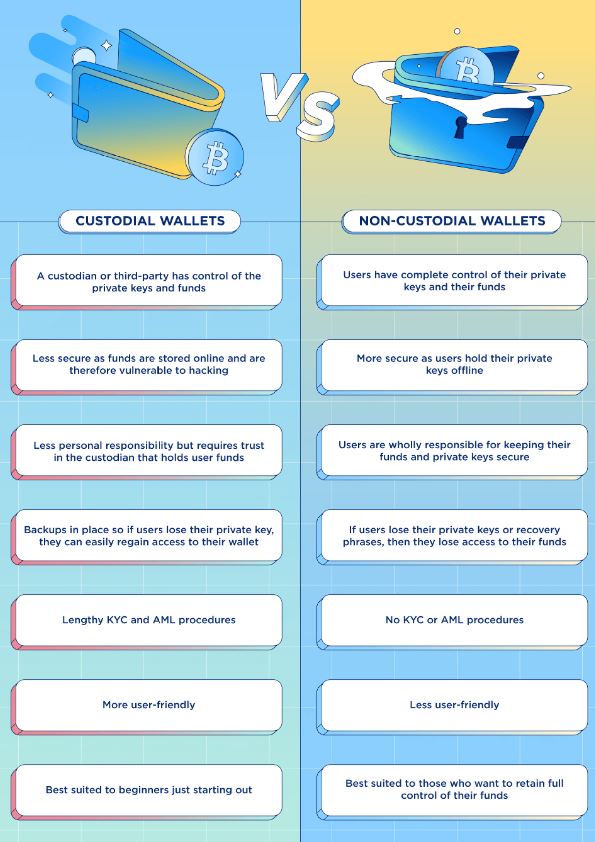
CHECK OUT THE RELATED ARTICLES HERE
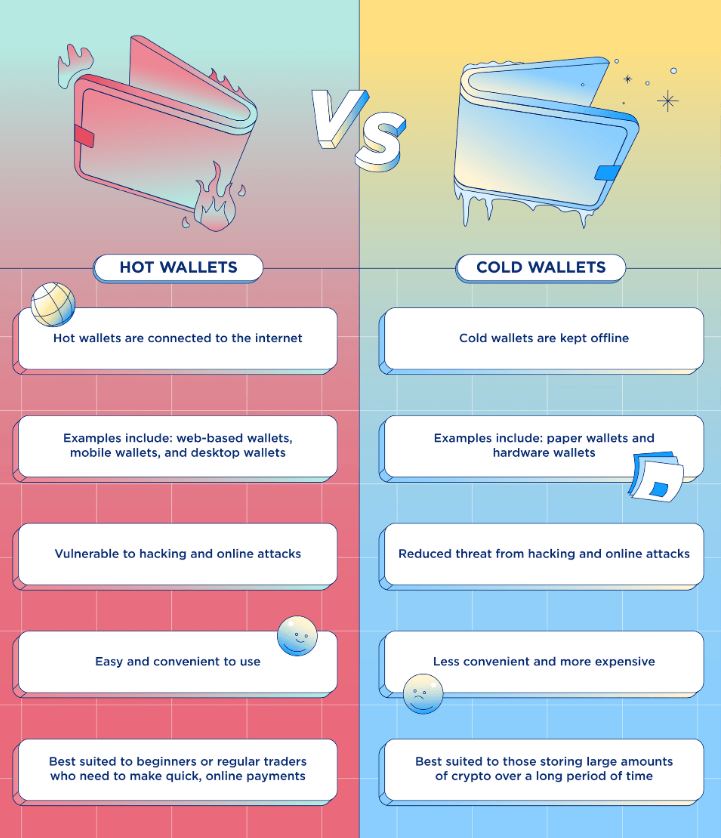
Contrary to popular belief, crypto wallets do not physically hold cryptocurrencies like the wallet in your pocket. Instead, they store the public and private keys required to buy cryptocurrencies and provide digital signatures that authorise each transaction.
There are several types of crypto wallets including physical devices, software, and even paper. Determining which crypto wallet is best for you depends entirely on your individual trading needs. Here are some fun facts about crypto wallets to help you make a more informed decision:
Crypto wallets are not connected to the internet, which means that they are much less vulnerable to hacking than traditional online wallets.
- -Some people choose to store their crypto keys on a physical device, such as a USB drive or even a piece of paper.
- -Crypto wallets come in many different shapes and sizes, but they all serve the same purpose: to store your private and public keys and allow you to make digital transactions.
- -The most important thing to remember about crypto wallets is that you are ultimately responsible for keeping your private keys safe. If you lose your keys, you will lose access to your cryptocurrencies.
If you’re new to the cryptocurrency world, you might be wondering: what exactly is a crypto wallet? Check out this article if you want more detail,
But in short, the term ‘wallet’ is actually somewhat of a misnomer as crypto wallets don’t really store cryptocurrency in the same way physical wallets hold cash.
Instead, they read the public ledger to show you the balances in your addresses and also hold the private keys that enable you to make transactions.
A cryptocurrency wallet is a digital storage device that holds your public and private keys while also providing an easy-to-use interface to manage your crypto balances.
Additionally, most crypto wallets support cryptocurrency transfers through the blockchain. And some wallets even allow users to perform certain actions with their crypto assets, such as buying and selling or interacting with decentralized applications (dapps).
So now that you know what a cryptocurrency wallet is, the next question is..
And the answer to that is yes. Whether it’s a real (self-custody) or a third-party (custodial) wallet, you’ll need one to interact with the cryptoverse.
If you’re only interested in buying and holding cryptocurrencies as an investment, then chances are you’ll need a wallet.
If you want to actively trade cryptocurrencies or interact with dapps, then you’ll definitely need a wallet.
The reason is that cryptocurrency transactions don’t represent a “sending” of tokens from one mobile phone to another. Rather, when you send tokens, you’re using your private key to sign the transaction and broadcast it to the blockchain network.
The network will then include your transaction in the next block it creates, which will reflect the updated balance in all participating wallets.
So remember, while a physical wallet might store $20 bills, a crypto wallet stores the equivalent of $20 worth of cryptocurrency.
And just like you wouldn’t want to lose your physical wallet, you also don’t want to lose your crypto wallet as it could mean losing all of your hard-earned cryptocurrency!
Crypto wallets come in all shapes and sizes, but there’s no one-size-fits-all solution. Each type of wallet has different strengths, purposes, and trade-offs. So it’s really up to you to weigh up what works best for you and your specific needs.
But before you can start buying and selling Bitcoin, Ethereum, or any other digital currency, you’ll need to set up a digital wallet. But how do you choose the right wallet for you?
There’s no one-size-fits-all answer to that question. It depends on how you intend to use your cryptocurrency, how much risk you’re willing to take, and what type of currencies you’re interested in.
For those with a high-risk tolerance who want to make regular, quick online payments, the convenience of a hot wallet would suit you best. But if you’re a little more gun-shy and intend to hold your coins long-term, then a secure offline device might make the most sense.
And if it’s the NFT market that you’re interested in, then you need to look for a wallet that is compatible with NFT marketplaces such as OpenSea, Solanart, and Crypto.com.
The bottom line is that there is no perfect solution when it comes to crypto wallets. It’s all about finding what works best for you and your needs.
There are many factors to take into consideration when choosing a crypto wallet. The first is whether you want a software or hardware wallet.
Software wallets are easier to use but are less secure, while hardware wallets are more secure but can be difficult to use.
Another factor to consider is the security features of the wallet. Does it have two-factor authentication? Fingerprint recognition? How user-friendly is the interface?
Another important factor is fees. Some wallets charge transaction fees, while others do not.
You should also consider which coins the wallet supports. Not all wallets support all coins.
Finally, you should consider whether the wallet has backup options in case you lose your device or forget your password.
Thats about it for now. Tell me what you think.
CHECK OUT THE RELATED ARTICLES HERE
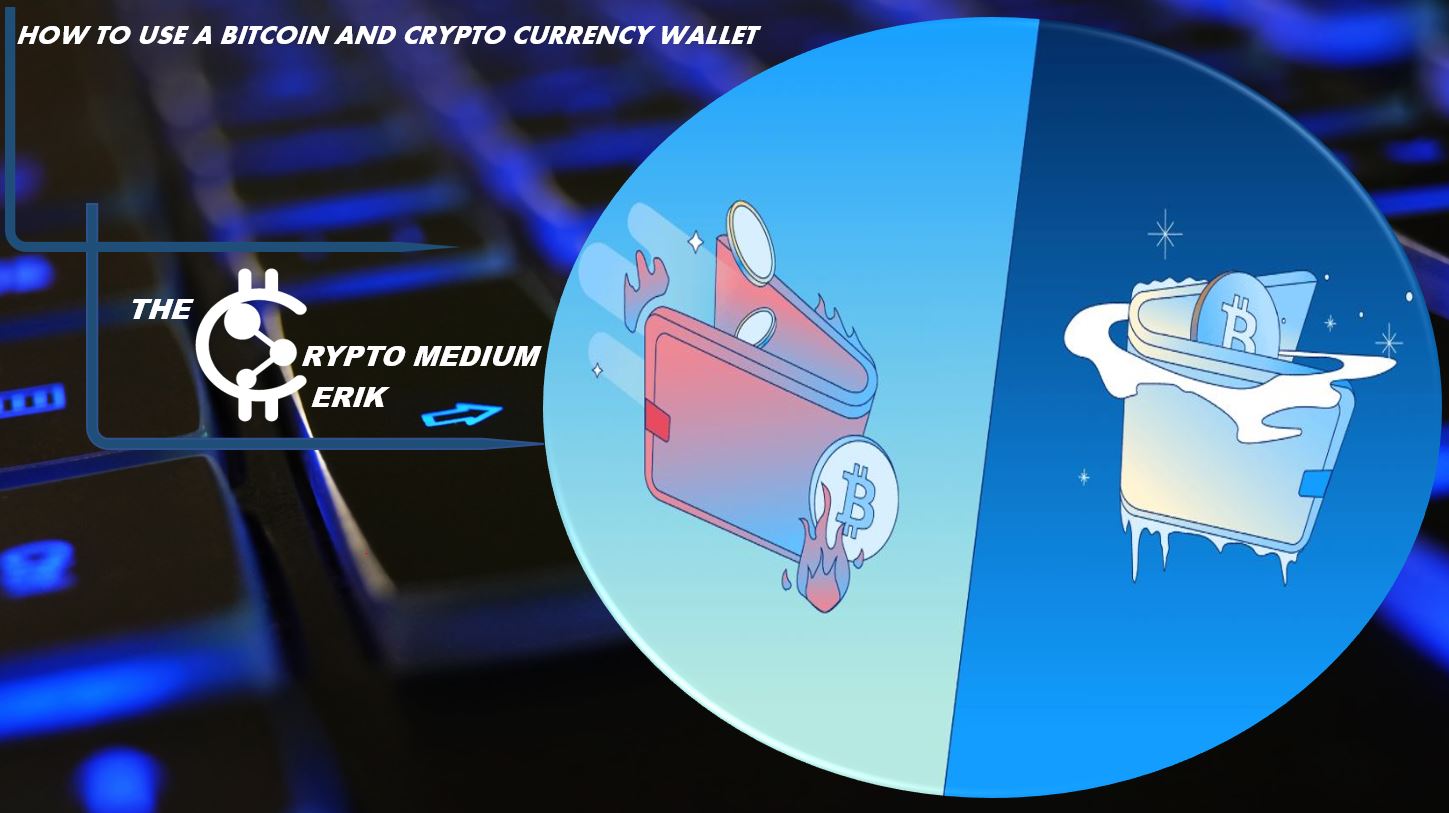
FAQ's
Just get off Zero for now. Stack sats and we can revisit this question in 5 years
No one can be sure, but we do know he’s said that he would like to use Bitcoin to pay for a trip to Mars. So, if you are planning to use Bitcoin or any other cryptocurrency to pay for your trip to Mars, you’ll need a wallet.
As a gerenal rule, Software wallets are free and hardware wallets cost money. Anywhere from $50 to a few hundred.
Just get your damn wallet and buy some bitcoin first..
I recommend the best products through an independent research and review process. I don’t have advertisers, but if I did they would not influence my writing. I may receive compensation in the future if you visit partners I recommend once I have them.

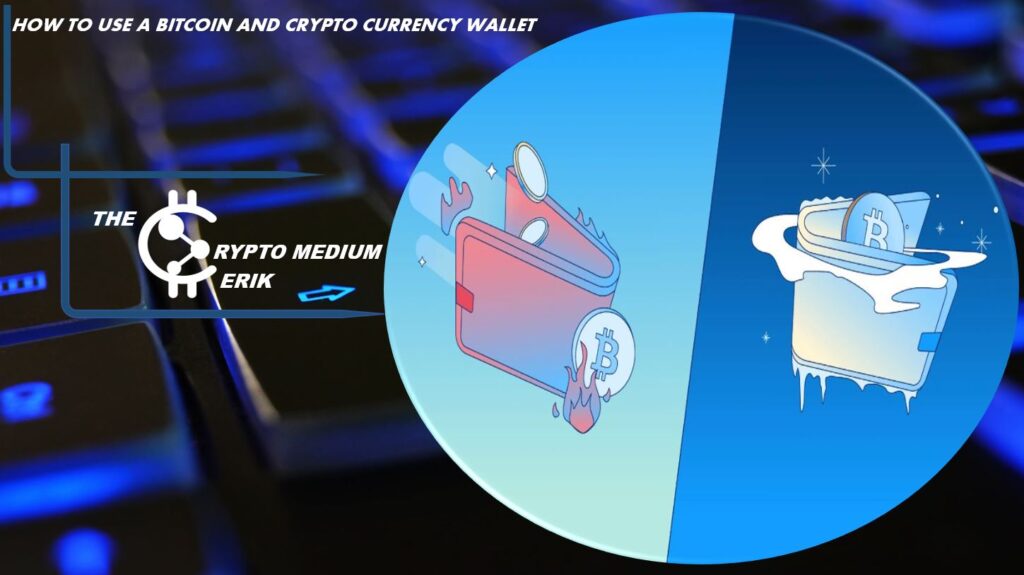

Pingback: What is a crypto currency and bitcoin wallet? - The Crypto Medium
Very good article. I definitely appreciate this website. Continue the good work!
Everything is very open with a really clear clarification of the issues. It was definitely informative. Your site is very helpful. Thanks for sharing!